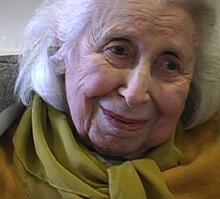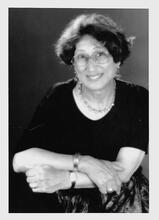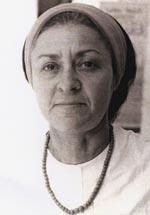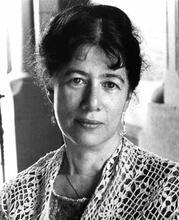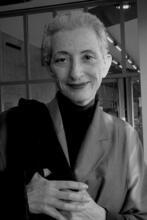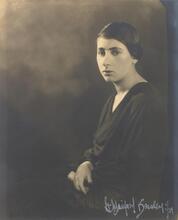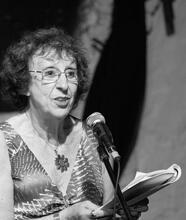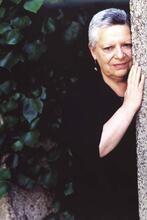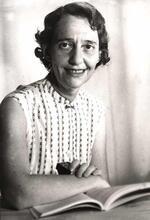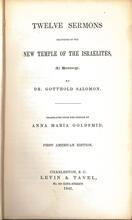Hedwig Lachmann
Poet and translator Hedwig Lachmann was the eldest of the six children of Isaak and Wilhelmine Lachmann. The family settled in Hürben/Krumbach, where Isaak, a passionate collector of liturgical music, became cantor and teacher of religion. Hedwig Lachmann attended the girls’ high school in Krumbach and, thanks to her great gift for languages, passed the language teaching examination in Augsburg when she was only fifteen years old. While serving as a governess, she wrote and translated poetry and worked as a journalist. She also worked with her husband, German-Jewish writer and anarchist Gustav Landauer, translating and writing on socialist topics.
Article
Poet and translator Hedwig Lachmann was born on August 29, 1865, in Stolp, Pomerania, the eldest of six siblings. Her father, cantor Isaak L. Lachmann (1838-1900) was from Neuteich, Prussia, and her mother, Wilhelmine Wohlgemuth Lachmann (1841-1917) was from Berent, Prussia. In April 1873 the Lachmann family settled in Hürben-Krumbach, where Isaak took over the position of cantor and teacher of religion. His passion was collecting synagogue songs, the first volume of which was printed in Leipzig in 1899.
Hedwig Lachmann attended the Fernsemersche Höhere Töchterschule, a girls’ high school, in Krumbach and, thanks to her great talent for languages, took the language teacher's exam in Augsburg at the age of fifteen. In 1882 she took up her first position as a private tutor in England; she later moved to Dresden and in 1887 to Budapest. From 1889 on, she lived in Berlin, where, in addition to her job as a governess, she cared for a seriously ill uncle and his deaf wife.
While serving as a governess, Lachmann wrote and translated poetry and worked as a journalist. In 1891, she published translations of poems by the American author Edgar Allan Poe. Her translations and her journalistic work brought her into the circle around Richard and Paula Dehmel. Richard Dehmel, the leading poet of the avant-garde of his time, became her literary mentor and her first great love. However, she vehemently rejected his proposal of a ménage à trois.
In the spring of 1899, Lachmann met the German-Jewish writer and anarchist Gustav Landauer (1870−1919). Although he was experiencing a profound crisis, Landauer wrote her love letters from the Tegel prison and won her friendship and love. Since Landauer was still married, the two went to England in 1901, but they returned to Berlin in early summer 1902. In August, their daughter Gudula was born.
Also in 1902, Lachmann published a collection of poetry Im Bilde. Eigenes und Nachdichtungen was published. Her translation of Oscar Wilde's Salomé (Leipzig 1903) was successfully premiered by Max Reinhardt in the Schall und Rauch theater and set to music by Richard Strauss in 1905.
In 1903, after Landauer's divorce, Hedwig Lachmann and Gustav Landauer married. They lived in Hermsdorf near Berlin and worked as translators and writers; among their works were Der Tod Arthurs (Leipzig 1912), a translation of Oscar Wilde’s The Portrait of Dorian Gray (Leipzig 1907) and his Socialism and the Soul of Man (Leipzig 1907). In 1906 their second daughter Brigitte was born.
From 1907 on, Lachmann supported Gustav Landauer in the founding of the "Socialist Bund" and wrote poems for his magazine Der Sozialist. In addition to her translations, she also took care of the household, and the family was the center of her life, especially during World War I. After the death of Lachmann’s mother in 1917, the Landauer family lived in Krumbach. In February 1918 Hedwig fell ill with the Spanish flu and succumbed to pneumonia on February 21, 1918.
Selected Works
Im Bilde. Berlin 1902.
Oscar Wilde. Berlin, Leipzig: 1905 (Die Dichtung 34).
Gesammelte Gedichte. Eigenes und Nachdichtungen. Ed. by Gustav Landauer. Potsdam: 1919.
Translations by Hedwig Lachmann
de Balzac, Honoré. Verlorene Illusionen. Leipzig: 1909 (with Gustav Landauer).
Der Tod Arthurs. Leipzig: 1912.
Wilde, Oscar. Salome. Berlin: 1903.
Wilde, Oscar. Das Bildnis des Dorian Gray. Leipzig: 1907
Wilde, Oscar. Der Sozialismus und die Seele des Menschen. Leipzig: 1907.
Bab, Julius. Richard Dehmel. O.O.: 1926
Heitele, T. and H. Lindenmayr, eds. "... already deposed on earth". HL. Krumbach: 2006.
Landauer, Gustav. Briefe und Tagebücher. 2 vol. Ed. by C. Knüppel. Göttingen: 2017.
Landauer, Gustav Briefe 1899-1919. 6 vol. Ed. by H. Delf von Wolzogen, J. Stenzel, I. Wiedemann. Göttingen: 2020.
Landauer, Gustav. Wie Hedwig Lachmann starb. Privatdruck.
Landauer, Gustav. Lebensgang in Briefen. Frankfurt am Main: 1929.
Seemann, Birgit. Hedwig Landauer-Lachmann: Dichterin, Antimilitaristin, deutsche Jüdin. Frankfurt: Campus Verlag, 1998.
Seemann, Birgit. "Mit den Besiegten." HL. German-Jewish writer and anti-militarist (1998). New edition: Lich: 2012.
Walz, Annegret. Hedwig Lachmann (unpublished manuscript).
Walz, Annegret. “Ich will ja gar nicht auf der logischen Höhe der Zeit stehen.” Hedwig Lachmann. Eine Biographie. Flacht: 1993.
Lexikon Jüdische Frauen. Edited by Jutta Dick and Marina Sassenberg.


